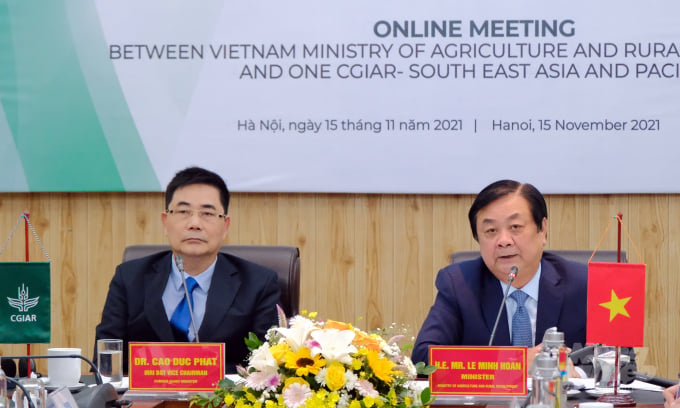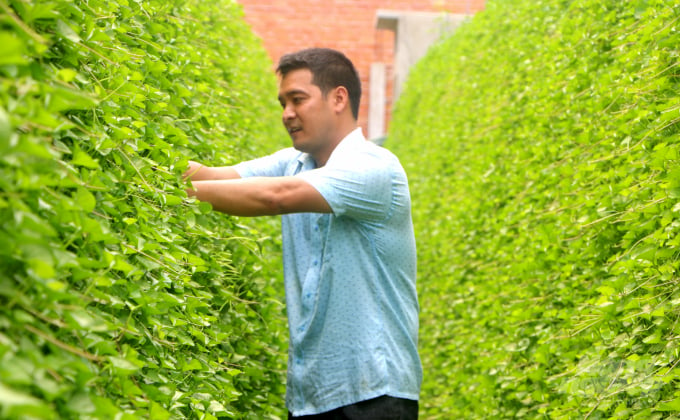November 28, 2025 | 02:31 GMT +7
November 28, 2025 | 02:31 GMT +7
Hotline: 0913.378.918
November 28, 2025 | 02:31 GMT +7
Hotline: 0913.378.918

Minister Le Minh Hoan (right) and Cao Duc Phat, former deputy head of the Central Economic Commission, attended a virtual conference with CGIAR on November 15. Photo: Bao Thang.
Vietnamese agricultural organizations need to quickly get over the situation of "global thinking - local action", said Minister of Agriculture and Rural Development Le Minh Hoan.
The minister made the statement at the virtual conference between the Ministry of Agriculture and Rural Development (MARD) and CGIAR in Southeast Asia & the Pacific on November 15.
Speaking at the conference, the Vietnamese minister said that Vietnam is facing three major changes – climate change, market change, and change in consumption trends, especially the increasing trend of green consumption around the world.
Besides, another transformation that is taking shape in recent years is the world's approach to agriculture.
"Vietnam is gradually shifting towards green agriculture. No single country can tackle the changes most of which are non-traditional on its own, particularly Vietnam which is at the beginning of economic thinking transition,” he said.
According to the leader of Vietnam’s agricultural sector, the country needs to assert its value in international organizations. He reckoned that the units within the sector should soon change their thinking and raise awareness so as not to waste international resources and avoid falling into the situation of "global thinking - local action".
As a global organization with the motto of reducing poverty, improving human health and nutrition, and enhancing ecosystem resilience, CGIAR highly appreciates the efforts of Vietnamese MARD in recent years and considers the country as a strategic partner in ensuring food security in the region.
Jean Balie, Regional Director for Southeast Asia & the Pacific, informed that CGIAR's priority in the region is to focus on addressing issues of urbanization, climate change, gender inequality, and social inequality... in large deltas, such as the Mekong Delta.
Through technological innovation, legal framework building, and policy improvement, CGIAR helps countries mitigate economic and social shocks.
The director added that Vietnam is a fast-growing market in Southeast Asia so CGIAR hoped that the organization and the MARD would continue to promote cooperation to build a better food system, helping people have more access to clean food and low-carbon production.

This picture shows a model of growing pennywort in a greenhouse in Dong Thap Province, which is managed via an application on smart phones. Photo: Bao Thang.
In response to comments from CGIAR, Minister Le Minh Hoan assessed that Vietnam needs support from many international organizations in issues of genetic modification, research on varieties, changes in farming methods, natural resource protection, biodiversity, and improvements in technology and capacity.
He acknowledged that these are vital issues in the transformation of Vietnam's agricultural model.
"We urgently need support from international organizations like CGIAR, both to help solve internal and regional problems," emphasized the Minister of Agriculture and Rural Development.
Some areas in Vietnam such as the Mekong Delta have come up with initiatives such as the shrimp-rice farming model that have approached ecological agriculture, but there has not been a collective action plan. To develop and spread the model, Vietnam's agriculture needs resources and technical support in eliminating the production mindset and integrating multiple values.
Through the virtual conference, the minister committed Vietnam’s participation in CGIAR forums to discuss more deeply about issues of the country as well as ASEAN. He also expressed his wish that Vietnam, with its position as a regional center, would have an opportunity to realise the ideas CGIAR has suggested.
The measures that the MARD intends to take soon include training and setting out specific policies for agricultural cooperatives and agricultural enterprises to approach new modern issues.
"Developing any policy must take into account costs. If we do not take all into account, we easily fall into the trade-off of agriculture. The costs include not only input costs but also intangible ones such as costs of damaging the environment, distorting biodiversity and ecosystems. They are the reasons why Vietnam needs to take drastic actions right now," Minister Hoan emphasized.
Translated by Luong Huong

(VAN) On November 27, in the meeting with Minister Tran Duc Thang, Mayor Yin Yong shared Beijing’s experience to improve environment and air quality.

(VAN) After 30 years, both sides identified strategic areas of cooperation: sustainable production, increasing coffee value and training for farmers.
/2025/11/27/4910-4-164708_294.jpg)
(VAN) On the afternoon of November 27 in Beijing, Minister of Agriculture and Environment Tran Duc Thang held a working session with several major Chinese enterprises operating in the agriculture and environment sector.

(VAN) The Department of Animal Health issued a provisional guideline requesting local authorities to increase surveillance, collect samples for testing, and conduct epidemiological investigations according to the established procedure.

(VAN) The United Nations recommends that Vietnam utilize data and artificial intelligence to enhance early disaster warnings and reduce GDP losses by 3.2% in the context of climate change.

(VAN) On the morning of November 27 in Beijing, Minister Tran Duc Thang and the Deputy Commissioner General of the General Administration of Customs of China signed a protocol on fresh jackfruit exports.

(VAN) As floodwaters recede, a vast network of irrigation works across eastern Gia Lai is emerging in a state of severe disrepair, with extensive damage demanding urgent restoration ahead of the 2025-2026 winter-spring cropping season.